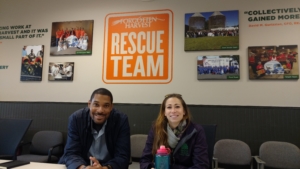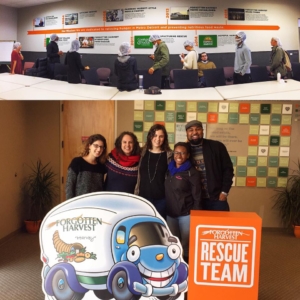For our second challenge, Fellows partnered with Forgotten Harvest, a nonprofit organization dedicated to relieving hunger in Metro Detroit and preventing nutritious food waste.
If you watched America’s Thanksgiving Parade in Detroit on TV this year, a tomato would have filled your screen between shots of floats and performers – a tomato that was rescued by Forgotten Harvest and introduced in a commercial about the organization. Forgotten Harvest rescues food from about 800 sources across a 2,000 square mile area, including grocery stores, fruit and vegetable markets, restaurants, caterers, dairies, farmers, wholesale food distributors, and other Health Department-approved sources. The over 42 million pounds of donated food, which would otherwise go to waste, is then delivered, free-of-charge, to over 250 emergency food providers in the Metro Detroit area. The food feeds nearly hundreds of thousands of people across Metro Detroit who are experiencing hunger because they are unable to obtain sufficient food for their households, or they struggling to avoid hunger and may not know where their next meal is coming from.
For our project partnership with Forgotten Harvest, Challenge Detroit was prompted with the following question: How might we help Forgotten Harvest, in collaboration with its partner agencies provide, the best possible support to people facing food insecurity?

Fellows Jeff and Miranda wait for the tour of the Forgotten Harvest headquarters to begin.
To provide Forgotten Harvest with innovative ideas, Fellows followed the human-centered, creative, iterative, and practical approach known as design thinking. Fellows were divided into teams to understand how to address agency food waste, optimize agency collaboration, develop models for agency recruitment of volunteers, define effective food distribution to high schoolers and seniors, and develop a marketing strategy.
Over the course of five weeks, the teams gathered information and insights by participating in a mobile food pantry, distributing food to attendees, touring the Forgotten Harvest headquarters and food storage facility, conducting interviews, distributing surveys, conversing with emergency food providers and partner agencies across the region, and some Fellows even participated in ride-alongs with Forgotten Harvest drivers on pickups and deliveries. Then Fellows brainstormed ideas, recommendations, and suggestions and developed prototypes, gaining input from Forgotten Harvest staff every step of the way.
Upon the conclusion of the project, over 40 community members gathered for a presentation at New Providence Church, a Forgotten Harvest partner agency that distributes over 1 million pounds of food annually, to hear about the Fellow’s learnings and recommendations. The ideas, many of which were shared at the presentation and all of which are included in various reports and documents provided to Forgotten Harvest, are innovative and designed to be implementable.

Fellows pose with Harvey and tour the Forgotten Harvest headquarters.
Fellows provided solutions to increase communication, connection, and education on print and digital platforms between Forgotten Harvest, the partner agencies, emergency food providers, and the clients that are offered food. Newsletters were designed to encourage collaboration within an agency network, and guides were created to share best practices and resources to connect clients with other services. Considering the importance of volunteers to the work that Forgotten Harvest does (over 15,000 people volunteered last year), Fellows offered millennial insight and developed models to recruit young people. Fellows also suggested composting food in collaboration with a farm to reduce food waste, developed an intensive marketing campaign to building awareness of Forgotten Harvest initiatives, recommended distributing food through high school farmers markets, and offering prepared food for distribution to homebound seniors.
Following the Fellow presentation, Mike Spicer, Vice President of Operations at Forgotten Harvest commented: “Collaboration with our partner agencies is some of our more important work to provide food to people facing food insecurity. We are honored to have worked with the deeply committed teams of Challenge Detroit Fellows and look forward to reviewing the Fellows’ thoughtful work.”
The Fellows are excited to see which recommendations are further developed to help Forgotten Harvest provide the best possible support to people facing food insecurity. To accomplish this feat, “no tomato can be left behind.”
This blog was written by Year Five Fellow Cassi Meitl.
